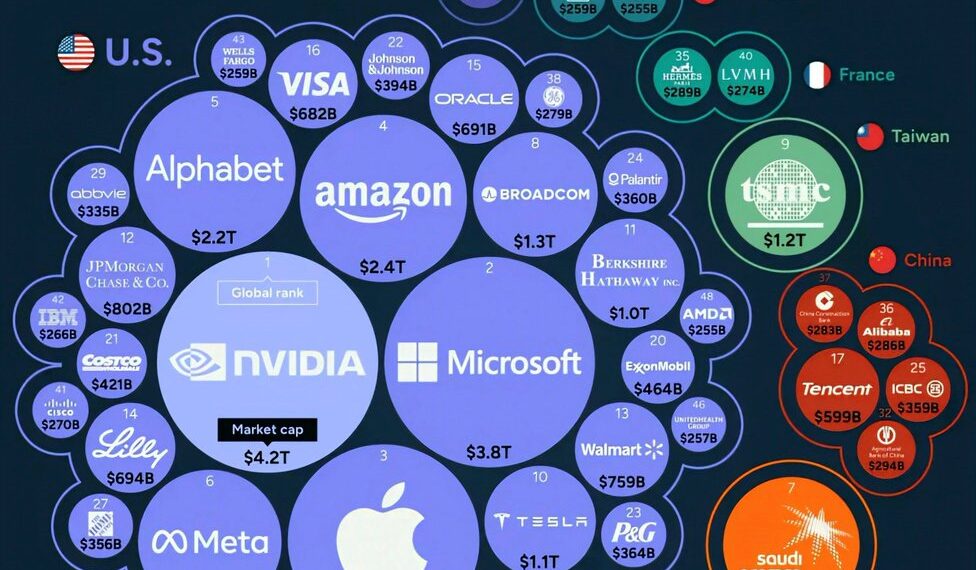Select Language:
Top 50 Largest Companies in the World

1. Apple Inc.
Leading the global giants, Apple continues to dominate with a market capitalization exceeding $3.5 trillion. The tech giant’s innovative products, such as the iPhone 15, MacBook Pro, and expanding services like Apple TV+ and Apple Arcade, sustain its dominance. Apple’s focus on sustainable energy and privacy has further strengthened its brand loyalty, making it the most valuable company in the world.
2. Saudi Aramco
Saudi Aramco, the world’s largest oil producer, maintains its position with a valuation surpassing $2.2 trillion. Despite global shifts toward renewable energy, Aramco remains critical to the energy sector, fueling economies across the Middle East and beyond. Its vast oil reserves and strategic partnerships secure its ongoing influence in global markets.
3. Microsoft Corporation
With a market value of over $2.8 trillion, Microsoft continues to innovate across a broad technology spectrum, including cloud computing, artificial intelligence, and gaming. The company’s Azure cloud platform fuels businesses worldwide, while products like Windows 11 and Xbox Series X enhance its consumer base. Microsoft’s strategic acquisitions, such as Nuance Communications, are turning it into a powerhouse in healthcare AI.
4. Amazon.com, Inc.
Amazon, valued at more than $1.8 trillion, remains at the forefront of e-commerce, cloud services, and entertainment. Its Prime membership program, Amazon Web Services (AWS), continues to generate most of its profits, powering everything from small startups to global enterprises. Recent investments focus on integrating drone delivery and expanding its logistics network to meet rising consumer demand.
5. Alphabet Inc.
Google’s parent company, Alphabet, commands a valuation close to $2.4 trillion. Its core search engine, advertising platform, and Android operating system form its revenue backbone. Recent ventures include advancements in autonomous vehicles (Waymo) and artificial intelligence initiatives aimed at transforming industries, ensuring Alphabet’s prominence remains unchallenged.
6. Tencent Holdings
A powerhouse in China, Tencent’s valuation exceeds $600 billion. Known for its social media platform WeChat and gaming portfolio, including PUBG and Honor of Kings, Tencent invests heavily in cloud computing and AI. Its strategic partnerships across Asia and investments in global tech startups bolster its international influence.
7. Tesla, Inc.
Tesla’s market cap has surged past $900 billion in 2025, driven by advances in electric vehicle technology, battery innovation, and autonomous driving capabilities. The company continues to lead the EV revolution, expanding manufacturing facilities worldwide and introducing new models like the Cybertruck. Its energy storage and solar energy solutions also contribute to its diversified portfolio.
8. Samsung Electronics
Samsung remains a top-tier global technology giant with a valuation exceeding $500 billion. It leads in smartphones, semiconductors, and display technology. Samsung’s recent investments in foldable devices and advanced chip manufacturing guarantee its position at the forefront of innovation.
9. Walmart Inc.
As the world’s largest retailer, Walmart’s valuation tops $450 billion, with a growing emphasis on digital transformation. Its e-commerce platform, grocery delivery, and new fulfillment centers enhance customer experience. Walmart’s sustainability initiatives focus on renewable energy and reducing waste across its supply chain.
10. Visa Inc.
Visa, valued at over $500 billion, continues to dominate global electronic payment networks. Its expanding digital payment solutions, including contactless and mobile payments, adapt quickly to changing consumer behaviors. The company’s investments in secure financial technology foster trust across its worldwide user base.
The landscape of global corporations remains dynamic, with changes in valuations driven by technological advancements, geopolitical shifts, and evolving consumer preferences. These companies represent a confluence of innovation, strategic expansion, and financial strength shaping the world economy in 2025.







